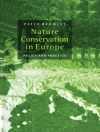Climate change and the related adverse impacts are among the greatest challenges facing humankind during the coming decades. Even with a significant reduction of anthropogenic greenhouse gas emissions, it will be inevitable for societies to adapt to new climatic conditions and associated impacts and risks. This book offers insights to first experiences of developing and implementing adaptation measures, with a particular focus on mountain environments and the adjacent downstream areas. It provides a comprehensive ‘state-of-the-art’ of climate change adaptation in these areas through the collection and evaluation of knowledge from several local and regional case studies and by offering new expertise and insights at the global level. As such, the book is an important source for scientists, practitioners and decision makers alike, who are working in the field of climate change adaptation and towards sustainable development in the sense of the Paris Agreement and the Agenda 2030.
قائمة المحتويات
Setting the scene: Adapting to climate change – a large-scale challenge with local-scale impacts (Salzmann).- Adaptation, Adaptation Science, and the Status of Adaptation in Mountain Regions (Mc Dowell).- Science in the context of climate change adaptation – case studies from the Peruvian Andes (Orlowsky).- Managing glacier related risks disaster in the Chucchún catchment, Cordillera Blanca, Peru (Muñoz).- Climate Change Adaptation in the Carpathian Mountain Region (Werners).- Community forest management as climate change adaptation measure in Nepal’s Himalaya (Rabin Raj).- Ecosystem based adaptation (Eb A) of African Mountain Ecosystems – Experiences from Mount Elgon, Uganda (Mumba).- Vulnerability Assessments for Ecosystem based Adaptation: Lessons from the Nor Yauyos Cochas Landscape Reserve in Peru (Dourojeanni).- The Role of Ecosystem-based Adaptation in the Swiss Mountains (Muccione).- Community perceptions and responses to climate variability: Insights from the Himalayas (Pandit).- Drought – in search of sustainable solutions to a persistent, ‘wicked’ problem in South Africa (Vogel).- Making Climate Resilience a Private Sector Business: Insights from the agricultural sector in Nepal (Trabacchi).- Shaping Climate Resilient Development – Economics of Climate Adaptation (Bresch).- Building Resilience: World Bank Group Experience in Climate and Disaster Resilient Development (Kull).- The science-policy dialogue for climate change adaptation in mountain regions (Kohler).
عن المؤلف
Nadine Salzmann is a senior scientist and lecturer at the Department of Geosciences, University of Fribourg, Switzerland and co-head of the Eclim research group. Her research centers on atmosphere-cryosphere interactions in high-mountain environments, with emphases on measuring and modelling climate change impacts. She has been conducting research at the University of Zurich and at the National Center for Atmospheric Research (NCAR), Boulder, CO, USA. For several years, she is leading and working for interdisciplinary climate change adaptation projects at the science-policy interface in the Alps, Andes, Himalayas and Central Asia.
Christian Huggel is at the Department of Geography, University of Zurich and co-head of the research group Climate & Environment: Impacts, Risks and Adaptation (Eclim). He has been working in mountain regions, including the European Alps, the Andes, Mexico, Alaska, the Caucasus and the Himalayas. He was a Lead Author of the IPCC Working Group II 5th Assessment Report and has been a science advisor of the Swiss delegation at the UNFCCC Conference of Parties (COP) and member of several mountain related scientific commissions.
Samuel U. Nussbaumer is a senior researcher at the Department of Geosciences, University of Fribourg and a postdoctoral fellow at the World Glacier Monitoring Service, University of Zurich. He has been working on sustainable mountain development and global change and has a particular research interest in past and present glacier changes, their impacts and perception. Several research projects in Europe (Alps, Scandinavia) and South America, with research stays in Bergen (Norway), Mendoza (Argentina), London (Canada) and Santiago (Chile).
Gina Ziervogel is a geographer by training, working in the field of adaptation and vulnerability to global environmental change. She is an Associate Professor in the Department of Environmental and Geographical Science and Research Chair at the African Climate and Development Institute at the University of Cape Town. Her research focuses on climate adaptation, governance, transformation and development from the household to municipal level. Gina was a lead author on the Intergovernmental Panel on Climate Change (IPCC) Special report on Managing the risk of extreme events and disasters to advance climate change adaptation (SREX) and in 2015 won the South African Young Woman in Science Award.












